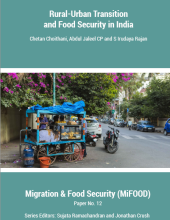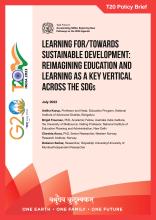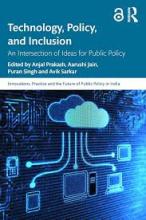Publications

|
Carol Upadhya Caste and Capital https://global.oup.com/academic/product/the-oxford-handbook-of-caste-9780198896715?lang=en&cc=ci In: The Oxford Handbook of Caste. Oxford University Press. ISBN 9780198896715 The chapter explores the historical and contemporary entanglements of caste and capital accumulation in India, drawing mainly on sociological literature. |

|
Chetan Choithani Rural-Urban Transition and Food Security in India (MiFood Paper No. 12). Working Paper https://93dfc2.p3cdn1.secureserver.net/wp-content/uploads/2023/07/MiFOOD12.pdf?time=1689954236 Co-Authored with Abdul Jaleel CP and S Irudaya Rajan, The Hungry Cities Partnership at the Balsillie School of International Affairs, Waterloo, Ontario, Canada. |

|
Anitha Kurup Outcome-based Education as Janus-faced Travelling Theory: Appeal for a Broader Research Agenda https://journals.sagepub.com/doi/10.1177/23476311231173486 Co-Authored With Debarun Sarkar. Higher Education for the Future 10(2) 139–152. A shift towards outcome-based education (OBE) is visible in an emerging set of educational policy and regulatory documents and higher education institutions across the country. The article argues for OBE to be approached through the lens of ‘travelling theory’ to foreground the process of translation across various scales, from the transfer of policy knowledge to negotiations in the classroom. By doing so, the article highlights the process of translation which remains at the core of OBE, as it tends to mobilize both managerial and behaviourist approaches along with a constructivist and constructionist approach. The popularity and acceptance of OBE and the disagreements surrounding it are made possible due to this Janus-faced nature of OBE. It argues for acknowledging the mobilization of multiple, contradictory and divergent epistemological approaches as integral to the process of translation of OBE. |

|
Shaima Amatullah, Shalini Dixit Situatedness of School Choice among Muslim Students: An Intersectional Approach https://doi.org/10.1177/09731849231187706 Contemporary Education Dialogue 20(2). So far research on school choice sets (decision about choosing a school from an available set of schools) has primarily regarded parents as key actors. This article emphasises that children are important actors as they inform parental decisions to co-produce certain choice sets. This paper suggest that factors like heterogeneities in social class, differential levels of religious discrimination/exclusion in schools and a need to protect their faith through education and the complex overlap between these were crucial in shaping choices. |

|
Shalini Dixit Dealing with denial of community history: The case of Adivasis in India https://www.routledge.com/Towards-Inclusive-Societies-Psychological-and-Sociological-Perspectives/Tiwari/p/book/9781032216867 Towards Inclusive Societies: Psychological and Sociological Perspectives, Edited By Dharmendra Nath Tiwari, Routledge 2023 This chapter is part of the book Towards Inclusive Societies: Psychological and Sociological Perspectives. The volume focuses on the importance of building inclusive societies and communities for global human welfare within psychological, social, political, and cultural realms. It discusses the engagement of psychology and other social science disciplines on the need for building both cultural sensitivity and interdisciplinary dialogue. |

|
Anitha Kurup, Cheshta Arora Learning For/Towards Sustainable Development: Reimagining Education and Learning as a Key Vertical Across the SDGs https://t20ind.org/wp-content/uploads/2023/07/T20_PolicyBrief_TF6_LearningForTowardsSDGs.pdf Co-Authored with Brigid Freeman and Debarun Sarkar. Force 6: Accelerating SDGs: Exploring New Pathways to the 2030 Agenda. T20 Policy Brief, July 2023. In many parts of the world, there is uncertainty about the diminishing quality of higher education systems. Concurrent crises have negatively impacted the well-charted policy trajectories in education (i.e., what is being taught), learning (i.e., what is being learned and how), and knowledge (i.e., what ought to be taught). Existing policy interventions primarily focus on formal spaces of learning, despite the growing recognition of informal learning, and long-standing commitments to lifelong learning. While school, vocational, and higher education are addressed under SDG4, the new realities of impending, multiple emergencies demand a reimagination of what it means to learn in an unpredictable environment. There is a need to build robust equitable infrastructures that can sustain the global mobility of learners across sectors as well as pedagogic tools and processes to interrogate and share diverse sustainable approaches being practised across the G20 nations. This Policy Brief calls for sustained effort to expand spaces, tools and methods of learning and put forward a blueprint for learning for/towards sustainable development as a key policy directive across all SDGs. |

|
Anitha Kurup The Social Life of Memes and Education https://link.springer.com/referenceworkentry/10.1007/978-981-16-9859-0_299-1 In M. Deshpande et al. (eds.), Encyclopedia of New Populism and Responses in the 21st Century,© Springer Nature Singapore Pte Ltd. Populism typically encompassed disciplines of political sciences and democracies. The inroads made by populism into other domains of knowledge brings to the center the social dimensions of New Populism as integral parts of curricula, pedagogy, and research in all disciplines. Drawing from Dawkins proposition of Meme as a cultural replicator, the paper explores the social processes where memes undergo variations and mutations as they diffuse through different human hosts in social networks. The interconnection of meme, social networks, power structures, and societal outcomes redefines the scope of education and research across domains. |

|
Anant Kamath ASSISTANT PROFESSOR, Inequality and Human Development Programme Old Caste Exclusions and New Digital Divides https://www.taylorfrancis.com/chapters/oa-edit/10.4324/9781003433194-8/old-caste-exclusions-new-digital-divides-anant-kamath Kamath, A. (2023). Old Caste Exclusions and New Digital Divides. In Technology, Policy, and Inclusion (pp. 179-205). Routledge India. |
